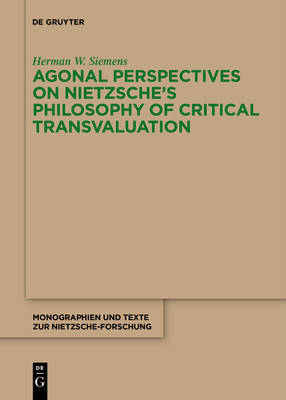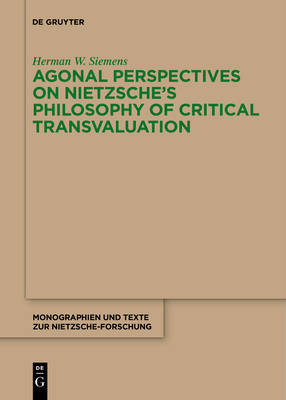
- Afhalen na 1 uur in een winkel met voorraad
- Gratis thuislevering in België vanaf € 30
- Ruim aanbod met 7 miljoen producten
- Afhalen na 1 uur in een winkel met voorraad
- Gratis thuislevering in België vanaf € 30
- Ruim aanbod met 7 miljoen producten
Agonal Perspectives on Nietzsche's Philosophy of Critical Transvaluation
Herman W SiemensOmschrijving
Nietzsche's strengths as a critic are widely acknowledged, but his peculiar style of critique is usually ignored as rhetoric, or dismissed as violent or simply incoherent. In this book, Nietzsche's concept of the agon or Wettkampf, a measured and productive form of conflict inspired by ancient Greek culture, is advanced as the dynamic and organising principle of his philosophical practice, enabling us to make sense of his critical confrontations and the much disputed concept of transvaluation or Umwertung. Agonal perspectives are cast on number of key problems in his thought across a broad range of texts. Topics and problems treated include: critical history and the need for a limit in the negation of the past; Nietzsche contra Socrates and the problem of closure; Nietzsche contra humanism and the problem of humanity; Nietzsche contra Kant on genius and legislation; the problem of self-legislation in relation to life and temporality; Nietzsche's sense of community in its articulation with law, and the normativity of taste; ressentiment and the question of therapy in Nietzsche and Freud; and the problem of total affirmation in relation to critique.
These studies have a broad appeal, from MA level to advanced Nietzsche research.
Specificaties
Betrokkenen
- Auteur(s):
- Uitgeverij:
Inhoud
- Aantal bladzijden:
- 323
- Taal:
- Engels
- Reeks:
- Reeksnummer:
- nr. 74
Eigenschappen
- Productcode (EAN):
- 9783111266725
- Verschijningsdatum:
- 8/05/2023
- Uitvoering:
- Paperback
- Formaat:
- Trade paperback (VS)
- Afmetingen:
- 170 mm x 244 mm
- Gewicht:
- 517 g

Alleen bij Standaard Boekhandel
Beoordelingen
We publiceren alleen reviews die voldoen aan de voorwaarden voor reviews. Bekijk onze voorwaarden voor reviews.











